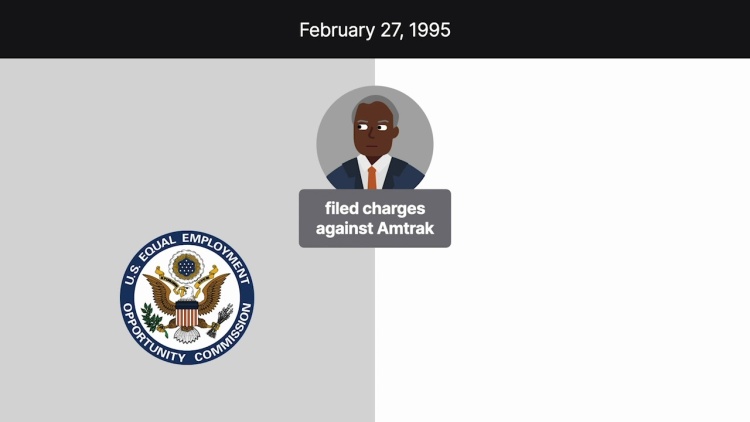National Railroad Passenger Corp. v. Morgan
United States Supreme Court
536 U.S. 101 (2002)
- Written by Abby Roughton, JD
Facts
On February 27, 1995, Abner Morgan (plaintiff), a Black male, filed a charge against his employer, the National Railroad Passenger Corporation (Amtrak) (defendant), with the EEOC and California’s Department of Fair Employment and Housing. Morgan alleged that he had faced harassment and harsher discipline than other Amtrak employees because of his race. Morgan also alleged the existence of a hostile work environment in which Amtrak managers made racial jokes, performed racially derogatory actions, used racial slurs, and negatively commented about Black employees’ ability to be supervisors. Some of the alleged conduct occurred within the 300-day period before the filing of Morgan’s charge, but much of the conduct occurred more than 300 days before the filing. Under 42 U.S.C. § 2000e-5(e)(1), an employee filing a charge of unlawful discrimination against an employer with the Equal Employment Opportunity Commission (EEOC) and a state regulatory agency had to file the charge within 300 days of the allegedly unlawful employment practice. The EEOC issued Morgan a right-to-sue letter, and Morgan sued Amtrak in federal district court. Amtrak moved for summary judgment, asserting that it could not be held liable for any alleged conduct that occurred outside the 300-day filing period. The district court agreed and granted partial summary judgment to Amtrak, holding that Amtrak was not liable for any conduct that occurred before May 3, 1994. The court of appeals reversed, holding that the continuing-violation doctrine allowed courts to consider conduct that was otherwise time-barred if the conduct constituted part of an ongoing unlawful employment practice. The United States granted Amtrak’s petition for certiorari.
Rule of Law
Issue
Holding and Reasoning (Thomas, J.)
What to do next…
Here's why 907,000 law students have relied on our case briefs:
- Written by law professors and practitioners, not other law students. 47,100 briefs, keyed to 996 casebooks. Top-notch customer support.
- The right amount of information, includes the facts, issues, rule of law, holding and reasoning, and any concurrences and dissents.
- Access in your classes, works on your mobile and tablet. Massive library of related video lessons and high quality multiple-choice questions.
- Easy to use, uniform format for every case brief. Written in plain English, not in legalese. Our briefs summarize and simplify; they don’t just repeat the court’s language.





